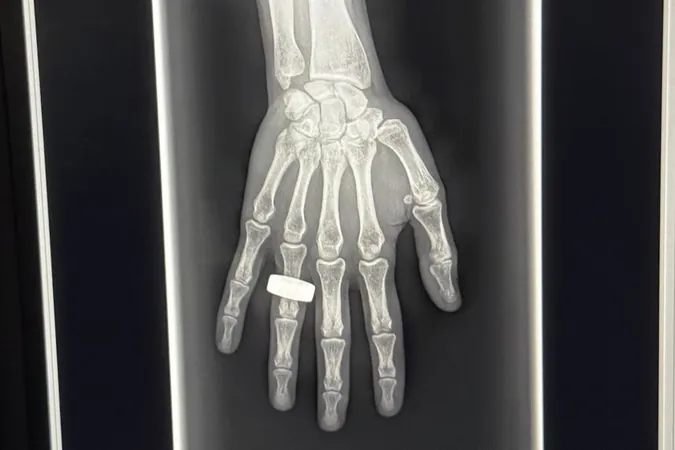
Unmasking Autism: The Surprising Signs You Might Be Overlooking
2024-12-30
Author: Sophie
Understanding Undiagnosed Autism
A leading psychologist has unveiled the common indicators that may suggest you are living with undiagnosed autism, a condition more prevalent than many realize.
Prevalence of Autism
In the United States alone, over 5.4 million adults—approximately 2.21% of the adult population—are estimated to have autism spectrum disorder (ASD). Alarmingly, research from Rutgers indicates that about 25% of teenagers with autism remain undiagnosed, leading to a silent struggle that continues into adulthood.
Recognizing Stimming
One of the more recognizable signs of autism is a behavior known as 'stimming,' which refers to repetitive movements or sounds. While stimming often has a reputation for being associated with notable repetitive actions such as hand-flapping or rocking, Dr. Sage emphasizes that many stimming behaviors can be remarkably subtle.
Common examples include hair twirling, fidgeting with jewelry, and the tactile enjoyment derived from rubbing or playing with a soft item—like a blanket or pen cap.
The Dual Nature of Stimming
Not every stimming behavior is benign, however. Dr. Sage cautions that some can evolve into disruptive habits such as skin-picking or nail-biting, which may lead to physical harm.
Other stimming signs she shares include making mouth sounds, tapping nails, and listening to the same song multiple times in a row.
Stimming and Its Social Perception
Dr. Sage reassures that everyone engages in some form of stimming, and these behaviors are not exclusive to autistic individuals. Yet, for many autistic people, such habits play a crucial role in managing overwhelming feelings of anxiety, excitement, or boredom.
Experts agree that while stimming is primarily a self-soothing mechanism, it can sometimes be misconstrued as aggressive or antisocial behavior by those unfamiliar with autism. This misunderstanding can hinder social interactions, particularly for children and teenagers who are already navigating the complexities of forming connections.
Behavioral Therapy and Coping Mechanisms
The risks associated with harmful stimming practices have led to the importance of behavioral therapies and environmental adjustments aimed at guiding individuals toward healthier coping mechanisms. While certain stimulating activities may persist into adulthood, treatment is available to help mitigate their disruptive effects.
Additional Signs of Autism
Beyond stimming, Dr. Sage identifies other telling signs that could indicate undiagnosed autism: heightened sensitivity, chronic anxiety, and feeling like an outsider in social settings.
For many autistic individuals, socializing can be overwhelming, requiring considerable recovery time afterward due to the difficulty of interpreting social cues and navigating intricate interpersonal dynamics.
Health Issues Association with Autism
Research has unveiled a strong connection between autism and various health issues, such as autoimmune diseases, allergies, or chronic pain. Dr. Sage points out how these physical health challenges can compound the experience of being an undiagnosed autistic adult.
Misdiagnoses and Historical Context
Despite increasing awareness, autism is frequently misdiagnosed, sometimes erroneously categorized as bipolar disorder, depression, or obsessive-compulsive disorder. Historically, autism was characterized by distinct categories such as Asperger's syndrome and childhood autism, but these designations have unified into the umbrella term "autism spectrum disorder" due to shared characteristics.
Treatment Options for Autistic Adults
For adults diagnosed with autism, treatment remains highly individualized. Options may include psychotherapy, cognitive-behavioral therapy (CBT), social skills training, and occupational therapy—each tailored to meet the unique needs of the individual.
Conclusion: Seeking Support and Understanding
As awareness grows, it is critical to demystify autism and help those who may identify with these signs receive the understanding and support they deserve. If you or someone you know exhibits these traits, it may be time to explore a conversation about autism and consider seeking a professional evaluation.









 Brasil (PT)
Brasil (PT)
 Canada (EN)
Canada (EN)
 Chile (ES)
Chile (ES)
 Česko (CS)
Česko (CS)
 대한민국 (KO)
대한민국 (KO)
 España (ES)
España (ES)
 France (FR)
France (FR)
 Hong Kong (EN)
Hong Kong (EN)
 Italia (IT)
Italia (IT)
 日本 (JA)
日本 (JA)
 Magyarország (HU)
Magyarország (HU)
 Norge (NO)
Norge (NO)
 Polska (PL)
Polska (PL)
 Schweiz (DE)
Schweiz (DE)
 Singapore (EN)
Singapore (EN)
 Sverige (SV)
Sverige (SV)
 Suomi (FI)
Suomi (FI)
 Türkiye (TR)
Türkiye (TR)
 الإمارات العربية المتحدة (AR)
الإمارات العربية المتحدة (AR)